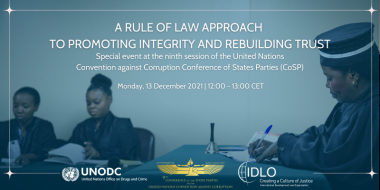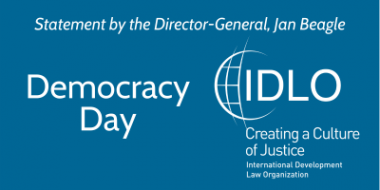Good Governance

By transferring resources from public to private hands, corruption negates the benefits of development. Similarly, favoritism and nepotism are the antithesis of fairness and equality. It is no coincidence that the most corrupt polities are also the poorest, most unequal and most justice-deficient. If the rule of law and development are to take hold, good governance is a necessary condition.
For this reason, IDLO has undertaken to expand its portfolio of integrity-focused projects. Promoting good governance is an area so broad as to be almost inexhaustible. In our case, it may mean helping countries make the institutions of justice cleaner and more responsive; reducing conflict of interest in procurement and public life; seeking to ensure adequate funding for the judiciary; or strengthening the capacity to fight fraud and economic crime.
In turbulent times, invest in justice and peace
“There are silver threads which the international community has woven into a tapestry known as the UN 2030 Agenda for Sustainable Development,” remarked IDLO’s Director-General Irene Khan at the opening of IDLO’s 2018 Partnership Forum. “At the heart of this tapestry is access to justice and the rule of law.”

Assembly of Parties and Partnership Forum 2018
The forthcoming Annual Meeting of the Assembly of Parties and Partnership Forum 2018 will take place on November 20 and 21, 2018.
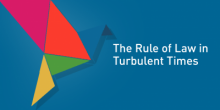
UNGA73 | Stand up for SDG16+
73rd Session of the United Nations General Assembly: Stand up for SDG16+
STATEMENT OF THE INTERNATIONAL DEVELOPMENT LAW ORGANIZATION
United Nations Headquarters, New York
Delivered by Irene Khan, Director-General, IDLO
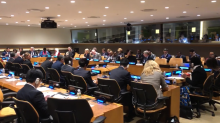
Postcards from prosecutors: Philippines Department of Justice
Prosecutors play a key role in keeping criminals off the streets. But in the Philippines, day-to-day challenges can significantly hamper their work. A severe shortage of staff has resulted in a heavy workload for existing prosecutors, with individuals spread thinly across multiple courts.

Dialogue on Electoral Justice: Exploring approaches for effective dispute resolution
Dialogue on Electoral Justice: Exploring approaches for effective dispute resolution
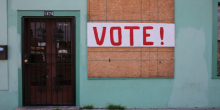
Kyrgyz Supreme Court publishes cases of alleged judicial interferences
The Supreme Court of the Kyrgyz Republic is now publicizing incidents of alleged out-of-process interferences in judicial activities online. The initiative represents an important measure in the context of the judiciary’s broader efforts to increase transparency and inform the public, and also works to prevent any undue influence or pressure on judges.

IDLO contributes to the Forum on Belt and Road Legal Cooperation
On July 2, 2018, The Ministry of Foreign Affairs of the People’s Republic of China convened the Forum on Belt and Road Legal Cooperation to increase legal exchange and cooperation between the countries and organizations involved in the ambitious '

IDLO seals partnership with Mexico’s Electoral Tribunal
IDLO and the federal Electoral Tribunal of Mexico have signed an agreement to expand their cooperative ties with a view to strengthening democratic processes and promoting the rule of law and access to justice.
Adopting a Fair Treatment Approach in Indonesia’s Ombudsman Offices
The Ombudsman of the Republic of Indonesia handles citizens’ complaints about public service delivery and maladministration. Often, similar complaints are filed, or citizens return with additional grievances, leading to the refiling of cases and extra legal and administrative costs. The Ombudsman of Indonesia seeks to improve its service delivery, its effectiveness when handling complaints and its relationship with citizens and other stakeholders.
Pages
Key Initiatives
-
 The Ombudsman of the Republic of Indonesia handles citizens’ complaints about public service delivery and maladministration. Often, similar complaints are filed, or citizens return with additional grievances, leading to the refiling of cases and extra legal and administrative costs. The Ombudsman of Indonesia seeks to improve its service delivery, its effectiveness when handling complaints and its relationship with citizens and other stakeholders.
The Ombudsman of the Republic of Indonesia handles citizens’ complaints about public service delivery and maladministration. Often, similar complaints are filed, or citizens return with additional grievances, leading to the refiling of cases and extra legal and administrative costs. The Ombudsman of Indonesia seeks to improve its service delivery, its effectiveness when handling complaints and its relationship with citizens and other stakeholders. -
 Through its decentralization and anti-corruption efforts, the Government of Ukraine is attempting to improve and extend the application of e-governance, or digital, tools in public administration based on international best practices. Over 100 existing registries and databases managed by various state institutions lack interoperability and do not allow for smooth exchanges of data between each other.
Through its decentralization and anti-corruption efforts, the Government of Ukraine is attempting to improve and extend the application of e-governance, or digital, tools in public administration based on international best practices. Over 100 existing registries and databases managed by various state institutions lack interoperability and do not allow for smooth exchanges of data between each other. -
 Corruption can be difficult to uncover, especially as technology is increasingly used to conceal corrupt behavior. Corruption cases handled by the Corruption Eradication Commission (KPK) that involve electronic evidence, such as e-mails or social media posts, have contributed to a conviction rate of 100 percent. Yet, law enforcement officers do not always allow electronic evidence in courts, and standard operational procedures providing guidance on electronic evidence handling and a digital forensic lab that meets international standards are lacking.
Corruption can be difficult to uncover, especially as technology is increasingly used to conceal corrupt behavior. Corruption cases handled by the Corruption Eradication Commission (KPK) that involve electronic evidence, such as e-mails or social media posts, have contributed to a conviction rate of 100 percent. Yet, law enforcement officers do not always allow electronic evidence in courts, and standard operational procedures providing guidance on electronic evidence handling and a digital forensic lab that meets international standards are lacking. -
 While the new Constitution of Kenya, 2010 provides for the right of every Kenyan to access justice, its implementation is vital to strengthen and support the changes required for a better Kenya. IDLO is supporting the Kenyan Government to implement the Constitution in an effective, efficient and sustainable manner, in accordance with international standards and best practices. This is being done with a view to enhancing access to justice for Kenyans, especially for women, children and other vulnerable populations.
While the new Constitution of Kenya, 2010 provides for the right of every Kenyan to access justice, its implementation is vital to strengthen and support the changes required for a better Kenya. IDLO is supporting the Kenyan Government to implement the Constitution in an effective, efficient and sustainable manner, in accordance with international standards and best practices. This is being done with a view to enhancing access to justice for Kenyans, especially for women, children and other vulnerable populations. -
 The Constitution of Kenya, adopted in 2010, made way for a new governance system composed of a national government and 47 county governments. Most of the assistance provided to the county governments has been focused on technical support. However, there is also a need to support the preparation of quality draft legislation to the county assemblies so that it meets the constitutional requirements.
The Constitution of Kenya, adopted in 2010, made way for a new governance system composed of a national government and 47 county governments. Most of the assistance provided to the county governments has been focused on technical support. However, there is also a need to support the preparation of quality draft legislation to the county assemblies so that it meets the constitutional requirements.
Latest Activity
|
Publication
|
|
Évènement
13 décembre, 2021 |
|
Policy Statements
|



